Citizen Science Opportunities - Birds
Are you looking for an opportunity to volunteer your time helping wildlife? Are you willing to help collect data on species and their habitats? Maybe you want to teach others about fishing or hunting. Chapter 5 of the 2015 State Wildlife Action Plan lists education and outreach efforts as one of the fundamental strategies needing implementation in South Carolina to benefit priority wildlife species and their habitats. In particular, SCDNR and its partners should "promote volunteer participation, both in education and outreach programs as well as in data collection. [High priority]."
There are many opportunities for the public to help gather information that biologists and researchers can use in assessing species and their habitats. Sometimes our biologists need seasonal help with specific projects. That's when our volunteers become vitally important. Listed below are some citizen science weblinks. Some are for SCDNR programs while others take you to our conservation partners' websites.
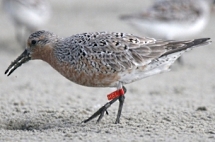 Reporting Banded Birds
Reporting Banded Birds
- Report banded birds (color band combinations, or bands with unique codes) to the Bird Banding Lab with the USGS or call 1-800-327-BAND.
Shorebirds
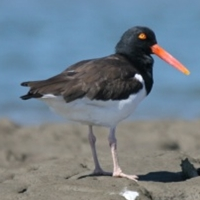 American oystercatcher – Report sightings of banded birds to the American Oystercatcher Working Group.
American oystercatcher – Report sightings of banded birds to the American Oystercatcher Working Group.- Audubon Shorebird Stewards help take shifts patrolling popular South Carolina beaches, educating beachgoers about shorebird life history needs and how to avoid negatively impacting them.
- Cape Romain Bird Stewards protect and monitor shorebirds and seabirds in the Cape Romain Region on weekends and holidays from May until August. Volunteers boat over to barrier island nesting colonies to help prevent detrimental disturbances to nesting birds by educating the public. The SCDNR contact for this program is Mary-Catherine Martin.
- Piping plover sightings of banded birds can be reported via email to the following addresses:
Cheri.Gratto-Trevor@ec.gc.ca
plover@umn.edu
vt.plover@gmail.com - Lack of suitable beach nesting areas and loss of nests to washover and predation possibly led the Least Tern in South Carolina to adapt to nesting on flat, pebble-covered roofs in the 1980s. If you know of a roof which has nesting Least Terns, please contact Mary Catherine Martin.
- Other shorebirds with bands can be reported here.
- Seabird Ecological Assessment Network (SEANET) needs volunteers to walk the beaches and collect information on stranded seabirds and mortality events.
Wading birds
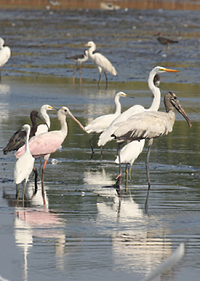 Volunteers may be able to assist the Wading Bird Program (nest monitoring, colony surveying, data entry and/or database design). SCDNR is
asking the public to report sightings of banded and tagged wading birds to wadingbirds@dnr.sc.gov
and also to the Bird Banding Lab or 1-800-327-BAND.
Volunteers may be able to assist the Wading Bird Program (nest monitoring, colony surveying, data entry and/or database design). SCDNR is
asking the public to report sightings of banded and tagged wading birds to wadingbirds@dnr.sc.gov
and also to the Bird Banding Lab or 1-800-327-BAND.- If you see wood storks, you can check to see if they have bands by looking at their upper legs.
- Tagged great egrets are also occasionally observed in South Carolina and can be reported to SCDNR and the Bird Banding Lab.
- Additional Details about reporting bands from SCDNR
Raptors
- Eagles – The Center for Conservation Biology is collecting locations of active eagle nests.
- Hawks – Participate in a hawkwatch count from September to November at various hawkwatch sites in South Carolina to help count and record migrating raptors. This data is collated by the Hawk Migration Association of North America (HMANA) in the semi-annual journal Hawk Migration Studies, which includes seasonal reports on the migration and more. This research is a driving force behind the Raptor Population Index (RPI), to promote scientific analysis of hawk count data.
To participate in the Botany Bay WMA Hawkwatch Volunteer program in Edisto Island, email Brianna Evans. - Nightjar – Help the Center for Conservation Biology survey for nightjar species (whip-poor-will, chuck-will's-widow, and nighthawk) as part of the Nightjar Network.
- Osprey – Help the Center for Conservation Biology collect data on Osprey by joining Osprey Watch.
- Peregrine falcon – The Center for Conservation Biology is collecting data on falcon sightings.
- If you see a Swallow-tailed Kite, you can help us determine their distribution, monitor population trends, and locate important nesting and foraging sites by reporting it through the Center for Birds of Prey.
- Injured Bird Transport Volunteer – Volunteer through the Center for Birds of Prey to help transport injured birds. Volunteers work within their own geographic area and, after receiving instruction in the principals and techniques essential to the safe capture and transport of injured birds of prey and some shorebirds, they are responsible for bringing injured birds to the Avian Medical Clinic from throughout the state. Training and authorization are required.
Additional Bird Opportunities
- Ruffed Grouse - Help SCDNR find ruffed grouse in South Carolina with smartphone app. Please note that you will need to use Google Chrome as your browser to submit the survey.
- Report Sick or Unusual Bird Deaths – In an effort to keep a watch out for highly pathogenic avian influenza (HPAI) in the United States, please report birds to the USDA (1-866-536-7593), your local veterinarian, or SCDNR. For more information, visit the USDA website.
- Christmas Bird Count: Participate in the National Audubon Society's program
- Great Backyard Bird Count: Participate in Cornell's Lab of Ornithology program
- Project Feeder Watch: Record bird species visiting winter feeders for the Cornell Lab of Ornithology.
- Project Nest Watch: Record the successes and failures of nesting attempts for various species for the Cornell Lab of Ornithology.
- Are you a Birding Enthusiast?, download your list of what you heard or saw at the eBird website. They are also asking participants to help document occurrences of female birds singing.
- Consider running a route for the USGS Breeding Bird Survey Route program. Many of South Carolina's routes need covering.
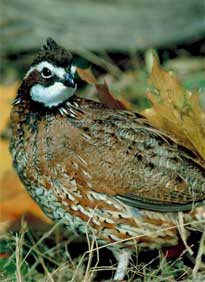 Bobwhite quail – Summer brood surveys are conducted through SCDNR.
Read about the species and contact the small game biologist to be placed on the mailing list. Hunter surveys are also taken on this species.
Bobwhite quail – Summer brood surveys are conducted through SCDNR.
Read about the species and contact the small game biologist to be placed on the mailing list. Hunter surveys are also taken on this species.
- Chimney swift – Assist Driftwood Wildlife Center track the first spring arrivals (through eBird) and create nesting towers for this migratory species.
- Hawks – Hawkwatch International provides opportunities to contribute data
on migrating hawk species.
Every year from the beginning of September to the end of November, the Center for Birds of Prey is host to the South Carolina Coastal Raptor Migration Study or "Hawk Watch" where each day volunteers are stationed on an observation platform from which they count all migrating raptors. This data is collated by the Hawk Migration Association of North America (HMANA) in the semi-annual journal Hawk Migration Studies, which includes seasonal reports on the migration and more. This research is a driving force behind the Raptor Population Index (RPI), to promote scientific analysis of hawk count data.
To participate in Sassafras Mountain Hawk watch in the fall, contact coordinator Ed Moorer at moorer03@bellsouth.net. - Mourning dove – Help the SCDNR band birds and report resightings. For more information on the dove banding project, call the Small Game Project in Columbia at (803) 734-3609 or visit the Mourning Dove Research and Management web page.
- Prothonotary warbler – Report banded prothonotary warblers seen in Biedler Forest to Audubon SC as part of their Project PROTHO.
- Purple martin – Record when you see the first scouts of the season at the Purple Martin Conservation Association website.
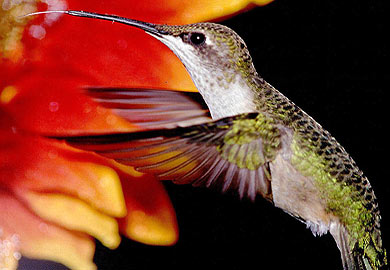 Ruby-throated hummingbird: Make observations about Ruby-throated Hummingbirds. Operation
Ruby Throat is an outreach initiative of Hilton Pond Center for Piedmont Natural History in York, South Carolina. Other hummingbird
sightings can be reported and tracked through the National Audubon Society's Hummingbirds at Home app.
Ruby-throated hummingbird: Make observations about Ruby-throated Hummingbirds. Operation
Ruby Throat is an outreach initiative of Hilton Pond Center for Piedmont Natural History in York, South Carolina. Other hummingbird
sightings can be reported and tracked through the National Audubon Society's Hummingbirds at Home app.
- Rusty blackbird – Assist the International Rusty Blackbird Working Group track the migration of this species as it travels north in spring through the Rusty Black Bird Blitz. Are there any hotspots on the landscape that attract them? What is the population estimate? Results are uploaded to eBird.
- Wild turkey – SCDNR is conducting a multifaceted research project on wild turkey movement ecology and habitat utilization. During our study, turkeys
will be subjected to hunting during the normal spring season on Webb, Palachucola and Hamilton Ridge WMAs (April 1 to May 1). During
each day of hunting, as many hunters as possible will be given a GPS Tracker unit which will collect the hunter's movement data as they
interact with the individual turkeys during the monitoring period. Using these data, along with data from monitored turkeys we will
evaluate turkey movements, response to hunters, and hunter success. This specific part of the research project will benefit from valued
added information as additional research studies on wild turkeys focusing on hunter response are ongoing in Texas and Louisiana. Interested
participants should contact Jay Cantrell at 803-625-3569.
SCDNR Summer turkey brood survey information
